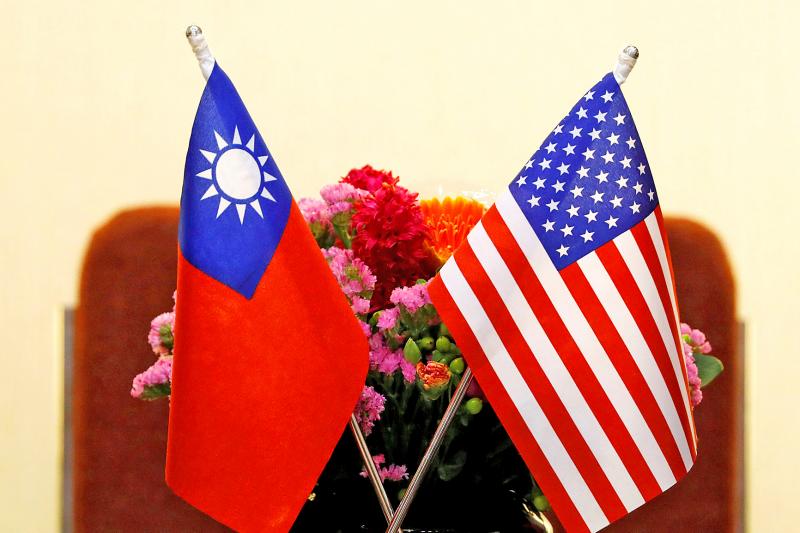President Tsai Ing-wen’s (蔡英文) administration is seeking to join an Indo-Pacific economic framework being planned by the US, a senior official said.
The government is paying close attention to the regional economic pact being touted by US President Joe Biden, although too few details have emerged from Washington for Taipei to make specific plans, the official said, speaking on the condition of anonymity.
The US is expected to launch the Indo-Pacific economic framework next month after negotiations with Australia, India and Japan, the official said.

Photo: Tyrone Siu, Reuters
The economic initiative is to tackle trade facilitation, standards for the digital economy and technology, supply-chain resiliency and clean energy, among other issues that affect the region, they cited White House officials as saying.
Washington has shown deep concern over semiconductor supply-chain issues, while Taiwan is a leading chipmaker and has an interest in enhancing ties between the two countries, the official said.
A push to enter the framework is not expected to negatively affect Taiwan’s ability to join the Comprehensive and Progressive Agreement for Trans-Pacific Partnership (CPTPP), as the organizations would not overlap and their goals are not in conflict, they said.
A week after China submitted its application to join CPTPP, Taiwan on Sept. 22 last year formally applied to join the trade bloc under the name “the Separate Customs Territory of Taiwan, Penghu, Kinmen and Matsu” through its representative in New Zealand, which acts as a depositary for the trade pact and is responsible for passing applications to all member states.
The US plans for a comprehensive economic framework for the Indo-Pacific is only one component in a larger regional strategy being considered in Washington, which Taiwan must observe closely, the official said.
Speaking at an event marking the 70th anniversary of the American Chamber of Commerce in Taiwan in December last year, Tsai said that Taiwan’s technological innovation and agile economy show that the country should play a role in the Indo-Pacific economic framework.

Alain Robert, known as the "French Spider-Man," praised Alex Honnold as exceptionally well-prepared after the US climber completed a free solo ascent of Taipei 101 yesterday. Robert said Honnold's ascent of the 508m-tall skyscraper in just more than one-and-a-half hours without using safety ropes or equipment was a remarkable achievement. "This is my life," he said in an interview conducted in French, adding that he liked the feeling of being "on the edge of danger." The 63-year-old Frenchman climbed Taipei 101 using ropes in December 2004, taking about four hours to reach the top. On a one-to-10 scale of difficulty, Robert said Taipei 101

A preclearance service to facilitate entry for people traveling to select airports in Japan would be available from Thursday next week to Feb. 25 at Taiwan Taoyuan International Airport, Taoyuan International Airport Corp (TIAC) said on Tuesday. The service was first made available to Taiwanese travelers throughout the winter vacation of 2024 and during the Lunar New Year holiday. In addition to flights to the Japanese cities of Hakodate, Asahikawa, Akita, Sendai, Niigata, Okayama, Takamatsu, Kumamoto and Kagoshima, the service would be available to travelers to Kobe and Oita. The service can be accessed by passengers of 15 flight routes operated by

Taiwanese and US defense groups are collaborating to introduce deployable, semi-autonomous manufacturing systems for drones and components in a boost to the nation’s supply chain resilience. Taiwan’s G-Tech Optroelectronics Corp subsidiary GTOC and the US’ Aerkomm Inc on Friday announced an agreement with fellow US-based Firestorm Lab to adopt the latter’s xCell, a technology featuring 3D printers fitted in 6.1m container units. The systems enable aerial platforms and parts to be produced in high volumes from dispersed nodes capable of rapid redeployment, to minimize the risk of enemy strikes and to meet field requirements, they said. Firestorm chief technology officer Ian Muceus said

MORE FALL: An investigation into one of Xi’s key cronies, part of a broader ‘anti-corruption’ drive, indicates that he might have a deep distrust in the military, an expert said China’s latest military purge underscores systemic risks in its shift from collective leadership to sole rule under Chinese President Xi Jinping (習近平), and could disrupt its chain of command and military capabilities, a national security official said yesterday. If decisionmaking within the Chinese Communist Party has become “irrational” under one-man rule, the Taiwan Strait and the regional situation must be approached with extreme caution, given unforeseen risks, they added. The anonymous official made the remarks as China’s Central Military Commission Vice Chairman Zhang Youxia (張又俠) and Joint Staff Department Chief of Staff Liu Zhenli (劉振立) were reportedly being investigated for suspected “serious